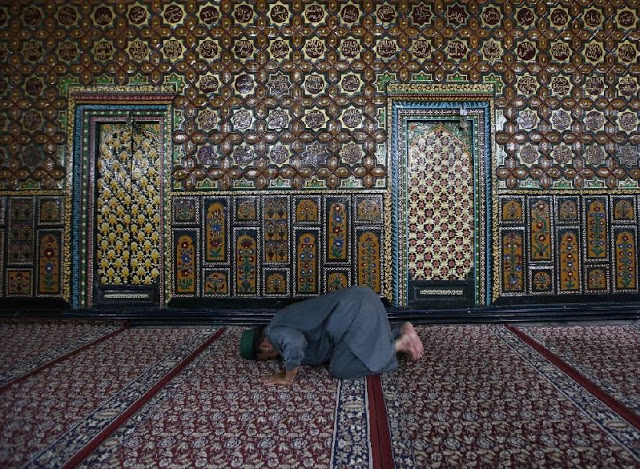Spiritual Sunday
I’m currently teaching Salman Rushdie’s Midnight’s Children in my Magical Realism course and came across a great description of being caught between blind faith and Enlightenment Reason.
Speaking for myself as a person of faith, I don’t see the two visions as incompatible. Sometimes one focuses on the material realm, sometimes on the spiritual. Nevertheless, it’s an effective passage.
The narrator’s grandfather, Aadam Aziz, is a Kashmiri Muslim who has returned from studying medicine in Germany. Unfortunately, Kashmir now looks small and provincial to one who has lived in Heidelberg, and as Aziz prays to Allah, he finds himself unable to block out the voices of his fellow students. Praying on a frosty morning, he bumps his enormous nose on the frozen ground:
On the morning when the valley, gloved in a prayer-mat, punched him on the nose, he had been trying, absurdly, to pretend that nothing had changed. So he had risen in the bitter cold of four-fifteen, washed himself in the prescribed fashion, dressed and put on his father’s astrakhan cap; after which he had carried the rolled cheroot of the prayer-mat into the small lakeside garden in front of their old dark house and unrolled it over the waiting tussock. The ground felt deceptively soft under his feet and made him simultaneously uncertain and unwary. “In the Name of God, the Compassionate, the Merciful…” – the exordium, spoken with hands joined before him like a book, comforted a part of him, made another, larger part feel uneasy – “… Praise be to Allah, Lord of the Creation…” – but now Heidelberg invaded his head; here was Ingrid, briefly his Ingrid, her face scorning him for this Mecca-turned parroting; here, their friends Oskar and Ilse Lubin the anarchists, mocking his prayer with their anti-ideologies – “… The Compassionate, the Merciful, King of the Last Judgement!…” – Heidelberg, in which, along with medicine and politics, he learned that India – like radium – had been “discovered” by Europeans; even Oskar was filled with admiration for Vasco da Gama, and this was what finally separated Aadam Aziz from his friends, this belief of theirs that he was somehow the invention of their ancestors – “… You alone we worship, and to You alone we pray for help…” – so here he was, despite their presence in his head, attempting to re-unite himself with an earlier self which ignored their influence but knew everything it ought to have known, about submission for example, about what he was doing now, as his hands, guided by old memories, fluttered upwards, thumbs pressed to ears, fingers spread, as he sank to his knees – “… Guide us to the straight path, The path of those whom You have favored…” But it was no good, he was caught in a strange middle ground, trapped between belief and disbelief, and this was only a charade after all – “… Not of those who have incurred Your wrath, Nor of those who have gone astray.” My grandfather bent his forehead towards the earth. Forward he bent, and the earth, prayer-mat covered, curved up towards him. And now it was the tussock’s time. At one and the same time a rebuke from Ilse-Oskar-Ingrid-Heidelberg as well as valley-and-God, it smote him upon the point of his nose. Three drops fell. There were rubies and diamonds. And my grandfather, lurching upright, made a resolve. Stood. Rolled cheroot. Stared across the lake. And was knocked forever into that middle place, unable to worship a God in whose existence he could not wholly disbelieve. Permanent alteration: a hole.
I love the phrasing “knocked forever into that middle place, unable to worship a God in whose existence he could not wholly disbelieve.” Many throughout history have fought a version of this battle. Aziz’s hole is described by Stephen Daedalus in Portrait of the Artist as a Young Man.
Only it’s not my battle, perhaps because I entered religion from the opposite direction. Raised in an atmosphere that didn’t encourage belief in the divine, I concluded in high school that Darwinism explained everything about earth’s creations. Yet even as I did so—I still recall where I was when I arrived at the conclusion—I sensed something wrong about being able to reduce all of creation to a set of scientific principles. I remember feeling both powerful and empty. Years later, I would choose to voluntarily enter Aziz’s middle place.
Only my middle place can be described with positives: I believe in God and I believe that science is a powerful force for truth. Unlike Aziz’s German friends, I have never mocked believers. I don’t feel the need to set myself up as an all-knowing judge of other people’s belief systems.
Faith can emerge out of open-mindedness.


